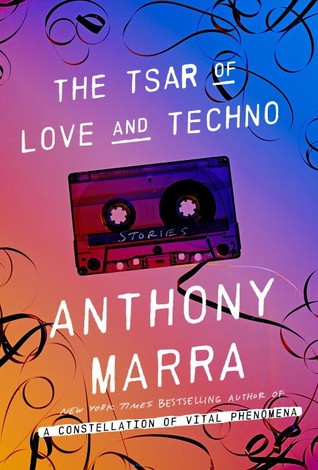The future is the lie with which we justify the brutality of the present.Like many other readers, I was totally blown away by Anthony Marra's A Constellation of Vital Phenomena – an incredible portrayal of the Chechen-Russian War about which I had known so little – so I was delighted to pick up The Tsar of Love and Techno; despite the unserious sounding title. In this book of nine interrelated short stories, we revisit the same territory as in the earlier book, focussing this time on the Russian combatants and the long reach of history that had led to these young men from a Siberian mining town ending up as mercenaries in the Chechen countryside. Line-by-line, the writing in this book is totally engaging, and as an overall work, Marra succeeds at both giving an overview of the dispassionate wheels of history that ruin entire communities and in making private tragedies intimately felt. This is a very successful book; more like a novel than a story collection.
In the first story, The Leopard, the setting is Stalinist USSR and we meet Roman Markin; a retoucher in the Department of Party Propaganda and Agitation. Not only is it Markin's job to improve the official photos of Stalin himself with subtle airbrushing techniques, but he must also remove undesirables from all photographic records of their existence; literally erasing those who have been disappeared. This story is a perfect place to start – with much subtle musing on the nature of memory and the endurance of art – and details from this beginning branch out into the following stories, tying everything together. Stretching from 1937 to 2013, travelling from Leningrad/Saint Petersburg and Kirovsk (a Siberian mining town whose nickel smelting is so polluting that metals can be recovered from the snow banks) to Grozny and the Chechen countryside, we repeatedly see a Polaroid of a family in leopard-print bathing suits, an aluminum birch forest, a DVD of a popular Russian spy movie, a mixtape – only to be listened to in an emergency – and most importantly, a minor mid-nineteenth century Chechen landscape painting, and the ways in which everything relates to each other is satisfying and rewarding. And I don't want to get more specific about the plot than that.
As for the writing, there was much amusing in this book despite the nonstop sense of doom and danger. In the middle story (the title story, also referred to as “The Intermission”) we meet Alexei: in his tenth year at university, he aspires to nothing more than being a professional aphorist, which is how he narrates his inner thoughts. This leads to serious musings like, “Turning I would to I did is the grammar of growing up”, and funny passages like:
Behind the ticket counter stood a man as skinny as a soaked poodle. He sported a shirt of swatch-sized plaid and a blond ponytail that, unless destined for a chemotherapy patient, should have been immediately chopped off, buried in an unmarked grave, and never spoken of again. Hipsterdom's a tightrope strung across the canyon of douche-baggery. He clung by a finger.I also laughed when Sergei – who eventually becomes an internet scam artist – explains to his father how he finds his targets: “I figured that somewhere online, there must be a list of Americans who will believe anything, no matter how implausible or insulting to their intelligence.” Sergei tells his father that he did, indeed, find such a list – Tom Hanks' Facebook fan page – and adds, “Those who enjoy his acting are unfamiliar with human nature.”
And I enjoyed when the writing took a more lyrical turn:
The calcium in collarbones I have kissed. The iron in the blood flushing those cheeks. We imprint our intimacies upon atoms born from an explosion so great it still marks the emptiness of space. A shimmer of photons bears the memory across the long dark amnesia. We will be carried too, mysterious particles that we are.For anyone who read Marra's earlier book and developed empathy for the Chechen people, this book doesn't challenge that by attempting to “tell the other side”; it simply demonstrates that the Russians have been enduring their own tragedies; doing what they can to survive in a system that was aimed against them from Stalin to Putin. If that involves denouncing a family member, becoming a gangster, or signing on as a hired gun, that's understandable as a survival tactic, but it's not really morally excusable. (And for anyone who read the earlier book and wants another look back at that world, there's glimpses as in: She gave birth to a daughter, Makka, at Hospital Number Six in Volchansk. A green-eyed girl, daughter of the head of surgery, mascot of the maternity ward, demanded a souvenir from her with the stubbornness of a bridge troll.)
So, if I can recommend The Tsar of Love and Techno highly, give examples of the writing that I really liked, and assure others that the short story format was interesting and rewarding, why only four stars? While I appreciate that the recurring images and objects were rather the point – that the state can't erase anything that is valued by individuals – sometimes it just went too far (and especially with the number of hands that that painting went through). Yet, there is much good in this book and I will happily seek out whatever Marra comes out with next.

